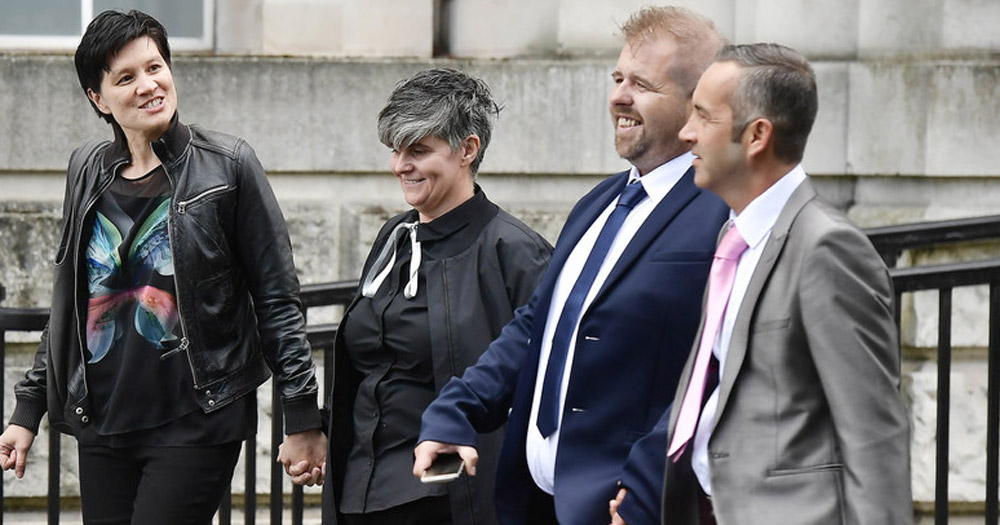The Court of Appeal has ruled hat LGBT+ couples in Northern Ireland faced unjustified discrimination while denied the opportunity to marry in Northern Ireland.
Senior judges decided not to make a formal declaration on any human rights breach as same-sex couples can now wed in the region.
The order came as a result of challenges by two LGBT+ couples, Ex-GCN staff member, Grainne Close and her civil partner, Shannon Sickles, and Chris and Henry Flanagan-Kane. They were the first couples to avail of civil partnership legislation in Northern Ireland 12 years ago.
Their case was brought to the Court of Appeal in 2017, two years before same-sex marriage was introduced in Northern Ireland.
On July 9, 2019 MPs in the House of Commons have voted in favour of an amendment to the Northern Ireland Bill which means that same-sex marriage will be legalised in Northern Ireland within three months if the devolved government remains stalled.
Up until that point, same-sex marriage has been blocked in Northern Ireland by the Democratic Unionist Party (DUP).
Marriage equality passed by a small majority in the Northern Ireland Assembly in 2015 but has not been enacted to date as the DUP used a petition of concern to prevent this from happening.
The petition of concern was designed during the peace process to prevent legislation from passing that would favour one community over another (in the case of Northern Ireland, Republicans and Unionists). However, the DUP has yet to clarify how the passing of Marriage Equality would be of detriment to Unionist communities.
The blocking of Marriage Equality by the DUP is a contributing factor to a current political stalemate which has led to the collapse of the Northern Ireland Assembly.
Delivering judgement yesterday Lord Chief Justice Sir Declan Morgan acknowledged the impact of same-sex marriage being introduced in the Republic of Ireland and Scotland in 2015, tow countries which he noted have “strong ties of kinship and friendship” with Northern Ireland.
“People who were married in those jurisdictions did not have their marriages recognised here and those who had formed civil partnerships here were prohibited from solemnising marriages in their own neighbourhood unlike their friends and relatives in those jurisdictions,” he said.
“In our view the events of 2015 and their consequences increasingly called into question the balance between the interests of those favouring tradition and the interests of those denied the opportunity to be seen as equal and no longer separate.”
Sir Declan confirmed: “We are satisfied that it was clear by the time of the delivery of the first instance judgment in this case in August 2017 that the absence of same-sex marriage in this jurisdiction discriminated against same-sex couples, that a fair balance between tradition and personal rights had not been struck and that therefore the discrimination was not justified.”
But he concluded: “In light of the legislative developments, there is no purpose to be served by making a declaration under… the Human Rights Act.”
© 2020 GCN (Gay Community News). All rights reserved.
Support GCN
GCN is a free, vital resource for Ireland’s LGBTQ+ community since 1988.
GCN is a trading name of National LGBT Federation CLG, a registered charity - Charity Number: 20034580.
GCN relies on the generous support of the community and allies to sustain the crucial work that we do. Producing GCN is costly, and, in an industry which has been hugely impacted by rising costs, we need your support to help sustain and grow this vital resource.
Supporting GCN for as little as €1.99 per month will help us continue our work as Ireland’s free, independent LGBTQ+ media.
